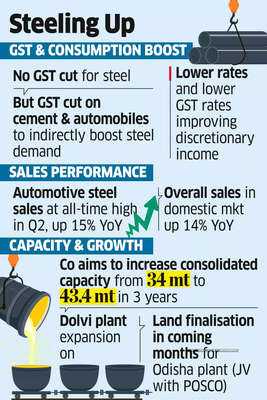Mumbai: The demand for steel in the seasonally strong second half of the fiscal will be further augmented by a pick-up in overall consumption, lower interest rates and pent-up demand coming in after extended and intense monsoon rains this year, said Jayant Acharya, chief executive officer of JSW Steel.
While there have been no changes in the GST rates for steel, the rate for cement and a host of other consumer discretionary products such as automobiles have been reduced, both of which will indirectly aid demand for the alloy, the country's largest producer of steel believes.
"The festive season and the GST rate cuts, along with lower interest rates, is giving people the confidence to step out and buy," Acharya told ET in an exclusive interaction. All these measures are adding up to the discretionary incomes of people, he said. "All this put together is resulting in a delta saving, which people are willing to spend." The company's sales of automotive steel in the September quarter, in fact, has been at all-time high, rising 15% as compared to the previous year. Its overall sales in the domestic market rose 14% on-year.
The company's sales of automotive steel in the September quarter, in fact, has been at all-time high, rising 15% as compared to the previous year. Its overall sales in the domestic market rose 14% on-year.
"Automobile sales were very good even in the pre-festive period and we expect the sales to be good even in the second half amid the festive period and wedding season," Acharya said.
This consumption-led demand will also be anchored by a pick-up in infrastructure spending from the government, which has spent around 38% of its planned ₹11-lakh-crore spend on infrastructure up to August.
"So you will see better capex hitting the ground in the second half. We are also seeing the private sector initiating capex given that capacities are now being utilised at 75-76%, he said. Capex, Expansion
JSW Steel has spent ₹6,535 crore on capital expenditure in the six months of this fiscal, of its planned capex of ₹20,000 crore. Payments of several long-lead items will fall in the second half of the fiscal, which will lead to a higher spend in this period, Acharya said. Long-lead items are items that take a long time to arrive even after their orders are placed, typically machinery.
By the end of this quarter, the company will be in a better position to ascertain whether it can spend the entire targeted capex amount, Acharya said.
With a production capacity of over 34 million tonnes, JSW Steel is currently the largest producer of steel in the country. It is expanding capacity at its plant in Dolvi and aims to have a consolidated capacity of 43.4 million tonnes in three years.
For its planned plant in Odisha with Korean steel major POSCO, the company will finalise a land parcel in the next few months. It expects to get environmental clearances and other approvals in the second half of the next fiscal.
While there have been no changes in the GST rates for steel, the rate for cement and a host of other consumer discretionary products such as automobiles have been reduced, both of which will indirectly aid demand for the alloy, the country's largest producer of steel believes.
"The festive season and the GST rate cuts, along with lower interest rates, is giving people the confidence to step out and buy," Acharya told ET in an exclusive interaction. All these measures are adding up to the discretionary incomes of people, he said. "All this put together is resulting in a delta saving, which people are willing to spend."
"Automobile sales were very good even in the pre-festive period and we expect the sales to be good even in the second half amid the festive period and wedding season," Acharya said.
This consumption-led demand will also be anchored by a pick-up in infrastructure spending from the government, which has spent around 38% of its planned ₹11-lakh-crore spend on infrastructure up to August.
"So you will see better capex hitting the ground in the second half. We are also seeing the private sector initiating capex given that capacities are now being utilised at 75-76%, he said. Capex, Expansion
JSW Steel has spent ₹6,535 crore on capital expenditure in the six months of this fiscal, of its planned capex of ₹20,000 crore. Payments of several long-lead items will fall in the second half of the fiscal, which will lead to a higher spend in this period, Acharya said. Long-lead items are items that take a long time to arrive even after their orders are placed, typically machinery.
By the end of this quarter, the company will be in a better position to ascertain whether it can spend the entire targeted capex amount, Acharya said.
With a production capacity of over 34 million tonnes, JSW Steel is currently the largest producer of steel in the country. It is expanding capacity at its plant in Dolvi and aims to have a consolidated capacity of 43.4 million tonnes in three years.
For its planned plant in Odisha with Korean steel major POSCO, the company will finalise a land parcel in the next few months. It expects to get environmental clearances and other approvals in the second half of the next fiscal.
You may also like

Oscar Piastri make feelings clear about McLaren No.1 driver plan after Max Verstappen win

HMRC changes pension tax rule as pensioners told 'you could be missing out'

Liz Hurley, 60, branded 'beauty' as she shares secret to looking ageless in tiny swimwear

Louvre robbery: Shocking moment thief in hi-vis breaks into cabinet in 7-minute raid

More humiliation for Prince Andrew as 'law could be changed to strip him of another perk'







